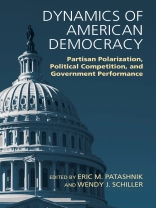Democracy is in crisis. Washington is failing. Government is broken. On these counts many politicians, policy experts, and citizens agree. What is less clear is why—and what to do about it. These questions are at the heart of
Dynamics of American Democracy, which goes beneath the surface of current events to explore the forces reshaping democratic politics in the United States and around the world.
Bringing together leading scholars and practitioners of politics and governance, this volume charts a twenty-first-century landscape beset by ideological polarization and political tribalism; rapid demographic, economic, and technological change; the influence of online news and social media; and the increasing importance of public attitudes about gender and race. Against this fraught background the authors consider the performance of the two-party system, the operations of Congress and the presidency, and the ways in which ordinary citizens form their beliefs and make their voting decisions. The contributors’ work represents a wide range of perspectives and methodological approaches and provides insight into what ails American governance, from the practice of politics as tribal warfare to the electoral rules that produce a two-party hegemony, and from the impact of social media—including how differently conservatives and liberals use Twitter—to the significance of President Trump in historical and institutional perspective.
Finally,
Dynamics of American Democracy goes beyond diagnosis to present and evaluate the value and viability of proposals for reforming politics.
Mục lục
Acknowledgments
Introduction, Eric M. Patashnik and Wendy J. Schiller
Part One: A Historical Perspective on Today’s Tribal Politics
1. The Rise of Tribal Politics in Historical Perspective, James A. Morone
2. Incremental Liberalism or Prolonged Partisan Warfare, Matt Grossmann
Part Two: Political Institutions and Government Performance
3. Legislative Stalemate in Postwar America, 1947-2018, Sarah A. Binder
4. Challenges of Measuring Party Unity in a Polarized Era: The 115th Congress, Frances E. Lee
5. Polarization and the Changing American Constitutional System: The Case of Federalism, Nolan Mc Carty
Part Three: Public Opinion and Political Behavior in a Polarized Era
6. She’s Not My Governor: Negative Partisanship and Trust in Government in the American States, Kristin Kanthak
7. Gender Attitudes and American Public Opinion in the Trump Era, John Sides, Michael Tesler, and Lynn Vavreck
8. Curating the News: How Social Media Facilitates Selective Exposure, Samara Klar and Yotam Shmargad
9. Charge and Retreat: Asymmetric Patterns of Political Engagement among Liberals and Conservatives, Deborah J. Schildkraut, Jeffrey M. Berry, and James M. Glaser
Part Four: Ideas for Reform
10. Politics Industry Theory, Katherine M. Gehl and Michael E. Porter
11. Spoiler Alert: Why Americans’ Desires for a Third Party Are Unlikely to Come True, Lee Drutman, William A. Galston, and Tod Lindberg
Part Five: Donald Trump and the Evolution of American Politics
12. Our “Undivided Support”: Donald Trump the Republican Party, and Executive-Centered Partisanship, Nicholas F. Jacobs and Sidney M. Milkis
Conclusion: Reflections and Paths Forward, Eric M. Patashnik and Wendy J. Schiller
About the Contributors
Index
Giới thiệu về tác giả
Eric M. Patashnik is Julis-Rabinowitz professor of public policy and political science and director of the MPA Program, Watson Institute for International and Public Affairs, Brown University.Wendy J. Schiller is professor of political science and international and public affairs and chair of the Department of Political Science at Brown University.












